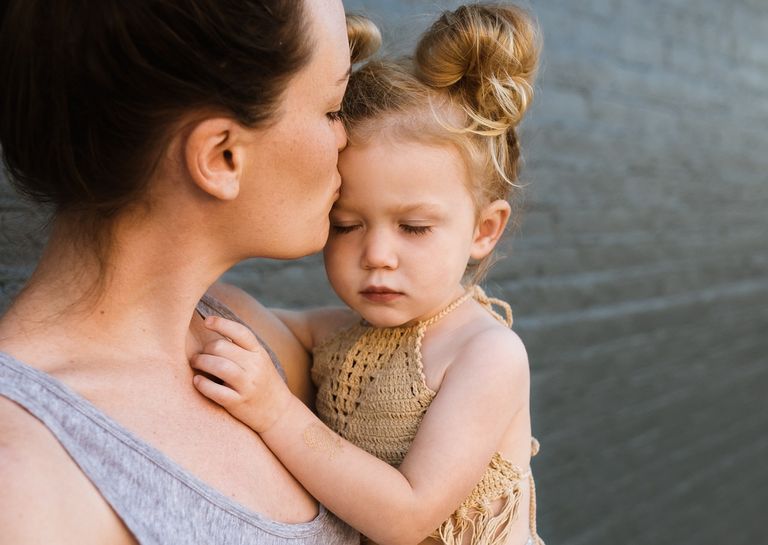Being a mother
Being a mother is a profound and transformative experience. It is a role that comes with immense responsibility, challenges, and rewards. As a mother, you have the opportunity to nurture and guide another human being, shaping their character, values, and future.
Motherhood involves various aspects, such as:

source
Unconditional love: Mothers often have a deep and unconditional love for their children. This love motivates them to care for, protect, and support their child's physical, emotional, and intellectual development.
Emotional connection: The bond between a mother and child is unique and special. Mothers often have an instinctive understanding of their child's needs and emotions. This emotional connection provides comfort, reassurance, and stability to the child.
Nurturing and caregiving: Mothers play a crucial role in providing for their child's basic needs, including feeding, bathing, and ensuring their overall well-being. They create a safe and nurturing environment where their child can grow and thrive.
Teaching and guiding: Mothers have a significant influence on their child's development. They teach important life skills, values, and ethics. Mothers guide their children through various stages of life, offering support, encouragement, and wisdom along the way.
Sacrifice and selflessness: Motherhood often involves making personal sacrifices for the well-being of the child. Mothers prioritize their child's needs and put their own desires aside. This selflessness is driven by a deep love and devotion to their child.
Multitasking and organization: Mothers become adept at juggling multiple responsibilities. They often manage household chores, work, and caregiving simultaneously. Organizational skills become essential in balancing various aspects of life.
Personal growth and fulfillment: Motherhood can be a source of personal growth and fulfillment. It offers opportunities for self-discovery, learning, and the development of new skills. Witnessing the growth and achievements of their child can bring immense joy and satisfaction to a mother.
Motherhood is a diverse and individual experience. Every mother's journey is unique, and there is no one "right" way to be a mother. Each mother brings her own strengths, values, and approach to parenting. Ultimately, being a mother is a deeply personal and rewarding experience that can shape both the mother and the child in profound ways.

source
Relationship between a mother and her child
The relationship between a mother and her child is one of the most fundamental and influential connections in human life. It is a bond that begins during pregnancy and continues to evolve and deepen as the child grows.
Here are some key aspects of the relationship between a mother and her child:
Unconditional love: A mother's love for her child is often described as unconditional. It is a deep and unwavering affection that transcends any circumstances or conditions. A mother's love is not dependent on the child's achievements, behavior, or external factors. It is a love that accepts and embraces the child for who they are, fostering a sense of security and belonging.
Emotional connection: The emotional bond between a mother and her child is unique and powerful. The mother is typically the primary caregiver during the early years, providing comfort, warmth, and emotional support. This bond forms the foundation for the child's emotional development and influences their ability to form healthy relationships in the future.
Trust and security: A mother's presence and care create a sense of trust and security for the child. Children often turn to their mothers for comfort and reassurance in times of distress or uncertainty. The mother's nurturing and protective role instills a sense of safety and stability, which is crucial for the child's overall well-being.
Nurture and guidance: Mothers play a vital role in nurturing and guiding their child's growth and development. They provide essential care, such as feeding, bathing, and meeting the child's physical needs. Mothers also serve as teachers, imparting values, knowledge, and life skills. They support their child's exploration, help them navigate challenges, and encourage their individuality and autonomy.
Communication and understanding: A mother's understanding and ability to communicate with her child are instrumental in building a strong relationship. Mothers often develop a unique language of love, intuition, and empathy that enables them to connect with their child on a deep emotional level. Effective communication fosters trust, mutual understanding, and the development of a strong bond.
Role modeling: Mothers serve as powerful role models for their children. Children observe and learn from their mothers' behaviors, attitudes, and values. A mother's actions and words influence the child's understanding of relationships, self-esteem, and worldview. Positive maternal role modeling can contribute to the child's overall development and shape their future interactions with others.
Lifelong connection: The relationship between a mother and her child extends beyond childhood. It continues to evolve and adapt as the child grows into adulthood. Although the dynamics may shift over time, the emotional bond remains significant. Many mothers and children maintain a deep connection throughout their lives, supporting each other through various stages, challenges, and milestones.
Mother-child relationship can vary depending on cultural, social, and individual factors. Every relationship is unique and influenced by the personalities, experiences, and circumstances of the individuals involved.

source
The role of mother on her child's life
The role of a mother in her child's life is multifaceted and crucial for the child's overall development and well-being. Here are some key aspects of a mother's role:
Primary caregiver: Mothers often serve as the primary caregiver for their children, especially during the early years. They provide nurturing, physical care, and meet the child's basic needs, such as feeding, bathing, and ensuring their safety. This caregiving role establishes a foundation of trust, attachment, and security for the child.
Emotional support: Mothers play a vital role in providing emotional support to their children. They offer comfort, empathy, and understanding during times of distress or emotional challenges. A mother's presence and availability help children develop emotional intelligence, self-regulation, and resilience.
Nurturer and educator: Mothers have a significant impact on their child's intellectual and cognitive development. They create a stimulating environment, engage in play, and encourage exploration and learning. Mothers introduce their children to language, concepts, and social skills, laying the foundation for future academic and personal growth.
Role model: Mothers serve as powerful role models for their children. Children observe and learn from their mothers' behaviors, attitudes, and values. A mother's actions and choices shape the child's understanding of relationships, self-esteem, and morality. By embodying positive qualities and values, mothers can inspire their children to become compassionate, responsible, and confident individuals.
Teacher and mentor: Mothers play a crucial role in teaching life skills and guiding their children's moral and ethical development. They impart important values, such as honesty, kindness, and respect, and provide guidance on navigating challenges and making decisions. Mothers also help their children develop essential skills like problem-solving, communication, and critical thinking.
Supporter and advocate: Mothers often advocate for their children's needs and well-being. They support their child's interests, talents, and passions, and encourage them to pursue their goals. Mothers provide a nurturing environment where their children feel valued, accepted, and supported, promoting their self-esteem and confidence.
Lifelong connection and support: A mother's role extends beyond childhood, maintaining a lifelong connection with her child. Even as children grow into adulthood, mothers continue to offer support, guidance, and unconditional love. They serve as a source of wisdom, a confidante, and a trusted advisor, providing a safe space for their children to turn to in times of need.

source
The role of a mother can vary depending on cultural, social, and individual factors. Different parenting styles and family dynamics may shape the specific manifestations of a mother's role. Ultimately, a mother's influence is profound and enduring, impacting the child's growth, development, and overall life trajectory.
Is anyone really prepared for motherhood?
Motherhood is a significant life transition that brings with it a wide range of emotions, challenges, and responsibilities. While individuals may feel excited and ready to become mothers, it is common for many to question whether they are truly prepared for this new role. The truth is that no one can be fully prepared for every aspect of motherhood, as each experience is unique and comes with its own set of circumstances and surprises.
Here are a few reasons why it can be challenging to feel fully prepared for motherhood:
Lack of prior experience: Becoming a mother is often a person's first experience in caring for and raising a child. It can be overwhelming to navigate the unknowns and uncertainties that come with this new responsibility.
Changing dynamics and demands: Motherhood brings significant changes to a person's life, including adjustments to their routine, sleep patterns, and personal time. Balancing the demands of caring for a child while also attending to one's own needs can be a learning process.
Unique child and individuality: Each child is different, with their own personality, needs, and development. What works for one child may not work for another, which can make it challenging to feel fully prepared for the range of situations and circumstances that arise.
Emotional and psychological adjustments: Motherhood often brings about intense emotions, such as love, joy, worry, and sometimes feelings of overwhelm or self-doubt. Adjusting to these emotional changes can take time and may not always align with one's expectations.
Constant learning and growth: Parenting is a continuous learning journey. As children grow and develop, mothers must adapt their approaches, gain new skills, and stay informed about various aspects of their child's well-being.

source
However, while no one can be fully prepared for every aspect of motherhood, there are steps individuals can take to feel more confident and equipped:
Educate yourself: Read books, attend parenting classes, and seek advice from trusted sources to learn about child development, parenting techniques, and strategies for navigating common challenges.
Seek support: Reach out to other mothers, join support groups, or seek guidance from experienced individuals who can offer insights and advice based on their own experiences.
Prioritize self-care: Taking care of yourself is essential for being able to care for your child. Prioritize self-care activities, seek help when needed, and don't be afraid to ask for support from family and friends.
Embrace flexibility and adaptability: Understand that motherhood is a dynamic and ever-changing journey. Embrace flexibility and be open to adjusting your expectations and approaches as you navigate the different stages of your child's life.

source
Remember, being a mother is a continuous learning experience, and it is natural to encounter challenges along the way. Trust your instincts, be patient with yourself, and remember that no one has all the answers. What matters most is the love, care, and dedication you bring to your role as a mother.
Being a good mother doesn't entails being good to your child alone
Being a good mother doesn't solely entail being good to your child. It also involves taking care of yourself, maintaining healthy relationships, and contributing positively to the broader community.
Here are a few aspects to consider:
Self-care: Taking care of your own physical, emotional, and mental well-being is essential to being a good mother. Prioritizing self-care activities such as exercise, getting enough rest, pursuing personal interests, and seeking support when needed allows you to recharge and be more present for your child.
Healthy relationships: Nurturing healthy relationships with your partner, family members, and friends can positively impact your overall well-being and indirectly benefit your child. Building strong support networks and maintaining open communication fosters a positive environment for both you and your child.
Personal growth and development: Continuously investing in your personal growth and development contributes to your ability to be a better mother. Pursue education, hobbies, or professional goals that align with your interests and aspirations. Expanding your knowledge and skills enhances your sense of fulfillment and can positively influence your parenting.
Embracing diversity and inclusivity: Encouraging a sense of respect, acceptance, and understanding towards diverse cultures, backgrounds, and perspectives is an important aspect of being a good mother. Teaching your child to appreciate diversity and promoting inclusivity helps them develop empathy, compassion, and a broader worldview.
Giving back to the community: Engaging in acts of kindness and giving back to the community instills important values in your child. Volunteering together, supporting charitable causes, or participating in community events not only benefits others but also teaches your child the importance of empathy, social responsibility, and making a positive impact in the world.
Being a good mother involves recognizing that your role extends beyond the direct care and nurturing of your child. By taking care of yourself, fostering healthy relationships, pursuing personal growth, embracing diversity, and contributing to the community, you model important values and create a positive environment that supports your child's overall development.
Charity begins at home when the mother is good and disciplined.
The saying "charity begins at home" emphasizes the importance of cultivating positive values, discipline, and good behavior within the family unit. When a mother embodies these qualities and practices discipline, it can have a significant impact on the overall well-being and development of her children.

source
Here's how:
Setting a positive example: Children learn by observing their parents. When a mother demonstrates good behavior, discipline, and values within the home, her children are more likely to internalize those traits and adopt them in their own lives. By modeling kindness, honesty, respect, and other positive qualities, a mother establishes a foundation for her children to emulate and practice.
Teaching discipline and responsibility: A mother's discipline and structure contribute to her children's understanding of boundaries, self-control, and responsibility. By establishing consistent rules and expectations, she helps her children develop essential life skills such as time management, organization, and accountability. This cultivates a sense of discipline that can benefit them throughout their lives.
Fostering a nurturing environment: When a mother maintains discipline and structure in the home, it creates a nurturing environment where children feel safe, secure, and loved. Clear guidelines and routines provide stability, reduce anxiety, and promote a sense of order. Children thrive in an environment that balances warmth and discipline, where they can grow and develop with confidence.
Instilling values and empathy: A mother's discipline and good behavior offer opportunities to instill values and develop empathy in her children. Through open communication and teaching moments, she can discuss the importance of kindness, compassion, and understanding. By emphasizing these values in daily interactions, a mother helps her children develop empathy, learn to consider the needs of others, and make positive contributions to society.
Promoting personal growth: Discipline and good behavior create an environment that supports personal growth and development. By encouraging her children to take responsibility for their actions and make choices that align with their values, a mother empowers them to develop self-discipline, resilience, and a strong moral compass. This sets the stage for their personal growth and the cultivation of a sense of purpose and integrity.

source
Discipline and good behavior should be balanced with love, understanding, and flexibility. Effective discipline involves clear communication, age-appropriate expectations, and considering individual differences and needs. By creating a positive and disciplined home environment, a mother can foster her children's growth and equip them with valuable skills and values that will serve them well in their lives.
Being a mother is a multifaceted and transformative experience that encompasses various roles and responsibilities. A mother's love, care, and guidance have a profound impact on her child's development and well-being. While no one can be fully prepared for every aspect of motherhood, there are steps individuals can take to feel more confident and equipped.
Being a good mother involves not only being good to your child but also taking care of yourself, maintaining healthy relationships, and contributing positively to the community. By prioritizing self-care, nurturing healthy relationships, pursuing personal growth, embracing diversity, and giving back to the community, a mother creates a positive environment that supports her child's overall development.
Conclusion
Furthermore, a mother's discipline, good behavior, and setting a positive example within the home contribute to her children's understanding of values, responsibility, and self-discipline. By fostering a nurturing environment, teaching discipline, and instilling important values, a mother empowers her children to become responsible, empathetic, and compassionate individuals.

source
Motherhood is a continuous learning journey, and no two experiences are the same. Each mother brings her unique strengths, values, and approach to parenting. By embracing the challenges and joys of motherhood, a mother has the opportunity to shape her child's future and create a lasting bond that extends beyond childhood.
Mothers are indeed irreplaceable!